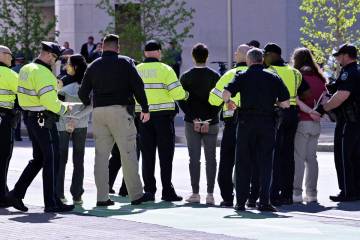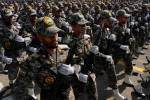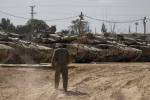Las Vegan’s book reveals husband’s letters from WWII
When he fought as a soldier, his motto was “We will.”
When he studied at Boston College, his goal was to be an actor, a lawyer, even a radio show host.
When he wrote to his parents from the battlefields of France and Germany in World War II, he was simply, “Your loving son, ‘Ed.’”
Fern Jennings never knew how lonely and loyal her husband was during Christmas of 1944 until after he died 40 years later and she opened a shoe box full of his letters.
It was Tuesday, Dec. 19, 1944, “somewhere in France,” when he wrote to his mother in Massachusetts.
“Six days until Christmas and what a celebration this one promises to be. All the savages are at peace, all ‘civilized’ people are at war. No doubt you have read in the papers about the little show the Germans are putting on and no doubt most of the people back home are worried about it,” he wrote. “But be assured of this, the outcome of it can be either very good or very bad. It will either bring me home a good deal sooner, or keep me here a whole lot longer.”
That letter followed one he had written four days earlier, on Dec. 15, 1944, that read, “You will no doubt receive this letter around Christmas time and you don’t know how much I wish I could be there. Perhaps next Christmas but I said that last year so the only thing to do is wait and see.
“So enjoy yourself. Leave a chair open, eat a leg of the bird for me &pretend I was there. I will be with you in spirit if not in body. … I can quite imagine Dad’s joy at having B.C. trounced by Holy Cross. A good answer might be the one that a bruised and battered Dartmouth tackle got during the game, when he was asked by a sarcastic opponent. ‘When are you going to put your first team in?’ … Your loving son, ‘Ed.’”
The 110 yellowed letters penned in blue ink and pencil preserve the story of Pvt. Edward Jennings’ late-teenage life as a curly red-haired, pipe-smoking soldier from his sweat-drenched days in boot camp to terrifying travels through towns and forests in France, Luxembourg and Germany. He served in a field artillery battalion that fought in the Battle of the Bulge with the 5th Infantry Division of Lt. Gen. George S. Patton’s Third Army.
“He never talked about it. Then we went to see the movie ‘Patton,’ and he said, ‘I don’t know how I ever got out alive,’ ” Fern Jennings said in a Dec. 11 interview at her Las Vegas home.
A legal secretary who is a tap dancer with the senior women’s patriotic troupe the Happy Hoofers, Fern Jennings married Ed later in life. He died in 1984, several months after they moved to Las Vegas from the East Coast. On a shelf in a closet before they moved from New Jersey she found the shoe box, where he also kept a jar of water that he took from the Danube River as a reminder of the war’s end.
She had seen the mason jar filled with water and its deteriorated “Danube River-June 1945” label, but she had never opened the envelopes and read the letters until several days after he died on Oct. 5, 1984, of leukemia at age 60. They were so compelling and he was such a good writer that she decided to compile them in a book. The 167-page soft-cover book, “Your Loving Son, ‘Ed,’” was published in 1994 for the 50th anniversary of the D-Day invasion in Normandy, France.
“I was so touched by the words of an 18-year-old boy to his mother, father and brother that I had to keep reading them throughout the next several days and nights,” she wrote in the introduction. “I thought how nice it would be to put the letters in a book for others to read. War veterans, parents and children can all relate to his experiences, his patriotism, his faith in God and his respect for his family.”
‘WAR AT ITS WORST’
“In June 1984, Ed wanted to go to the 40th Anniversary events in Normandy but he didn’t feel strong enough to make the trip,” she wrote, adding on the back cover: “Edward J. Jennings Jr. wrote wonderful, heartwarming letters of devotion to a family from which he had never been separated. These letters reveal his feelings, frustrations, fatigue and the horrors of war facing a soldier in combat.”
His letters, including some that were censored to protect sensitive military information, weren’t always about dead soldiers and chasing Nazi forces back to Germany. Many were about everyday life in the Army — the grueling training exercises, the mess hall chow, feverish days in the infirmary and foot-loose times on leave. In every case, his descriptions put his mom, dad and little brother in his boots.
For example, in a letter on May 13, 1944, he shared the beauty of Northern Ireland while waiting in anticipation of the Normandy invasion, two months before the Red Diamond division landed at Utah Sugar Red Beach near St. Mere Eglise, France, on July 9, 1944.
“I’m sitting out here in the backyard plopped up against a tree watching the old sun go down,” he wrote. “And, believe me, it is beautiful. Perhaps I can describe it to you as I sit here puffing away on my pipe.
“The atmosphere is so peaceful it permeates everything. The grass beneath me is so cool and green as any emerald you have ever seen. The gentle breeze is like velvet to your touch filled with a scent as lovely as the most priceless perfumes of the East. And way up there in the heavens the sun in all her cardinal majesty is making her glorious exit in the west but with a promise of dawn tips with gold all it touches. The sky is blue as sapphires and from her bosom hangs little tufts of clouds like sugar candy all proudly glistening in the galaxy of colors in a reflected glory of their master now sinking to his rest in that distant horizon.”
After the landing, he found time to quell his folks’ worries with words that he had survived but was still in peril:
“I am in a foxhole just as far below the ground as I can get. And this is the safest place to be for those German 88s are really rugged. Naturally censorship is very strict and I can tell you practically nothing except that at the present moment I am all right.”
Then there was his description of “war at its worst,” at St. Lo, France, on Oct. 5, 1944.
“I shall never forget what this city about the size of Dorchester looked like when the enemy was finally driven out. Dead cows bloated by the kiss of death, burnt out vehicles, dead Germans, and not one building left standing. None of us will ever forget St. Lo. Don’t be misled, there were plenty of dead Yanks lying in the streets &fields. Although most of them had been carted away for mass burial.”
And, on Dec. 4, 1944, Pvt. Jennings ached from homesickness but was steadfast in his effort to send money home to his family enduring the lingering effects of the Great Depression.
“I am enclosing a money order for $40, which you can salt away for me as usual. It almost represents the money I made on the Army-Notre Dame game. I haven’t as yet received any of the packages you have sent but I imagine they will be along soon. So far I have done all right eating what the other fellows got &sweating out my own. There is no doubt about it, the weather is cold, wet &muddy but it is not half as cold as Boston is at times and as yet there has been no snow.”
With lines like, “You are taught to play for keeps so that the idea of harming, even killing, becomes too natural to you,” his insights on Army training are thread throughout the book. They lead to mindset changes in some of the last letters he wrote about the close calls, the horrors of combat and his hate for the enemy.
CLOSE CALLS, KILLING FIELDS
As the 5th Division penetrated deeper into Germany, he caught a glimpse of how German citizens loyal to Adolf Hitler had lived while others suffered. He wrote about taking over the house of a family of “the master race,” seeing a photo of the son in a German uniform, then tracking him to another house, and how he “dragged him out on his ear and gave him to the M.P.s.”
“So hating the master race as we do we had no inhibitions remembering what they did to Poland, Russia, etc. and seeing what they did to France &Luxembourg.
“When you see what they have done and how they rode the gravy train once, then I would just as soon have put a bullet into everyone in the family. I look at these little innocent kids playing in the streets and wonder if he will be fighting my son some day. Then I wonder why we don’t shoot them all and guarantee that he won’t. He wouldn’t be the first German I’ve killed and I hope not the last.”
With that said in what is one of his longest letters, he reflects on a nighttime walk during which he tumbled into a ditch.
“I realized that my knee was not on the ground but on something soft,” he wrote March 19, 1945, from “somewhere in Germany.”
“I grasped my flashlight and turned on the beam and what it showed is something I shall never forget. The beam fell on the slightly purple, pale, slightly bloody face of a dead German soldier. My knee was on his chest since I was bending over, his face was about a foot from mine. That face and those glossy eyes staring at me, so cold and deathly so near my own were the first and only things I saw.”
Five days later his squad was ambushed while riding in rural Germany.
Machine gun bullets filled their truck with holes.
“It was only by the grace of God that someone wasn’t killed,” he wrote on Saturday, March 24, 1945.
“I know one of the bullets went through my bag … and ripped my spare stocking and carton of cigarettes to pieces. We all jumped from the truck into a ditch at the side of the road. It’s funny you don’t get scared, at least I know I didn’t. I just got mad. I fired a few rounds at their position and then in my usual unpredictable fashion, leaped from the ditch, ran and dived behind a tree about 15 yds. away. … One bullet barely grazed the top of my hand. My ammunition was almost gone when they suddenly raised a white handkerchief and walked forward with their hands over their head.”
WHAT MOTHERHOOD MEANS
Somehow amid all the chaos, Jennings found time to write about motherhood. “To men who think nothing of death, to whom killing is a job, whose whole outlook is cold and hard, there is one thing that remains sacred and that is a soldier’s mother. She is the queen of his heart. … Though they talk rough, play rough, no matter how rotten a man is way down in his heart there is a soft spot for her whose place no other woman will ever take.”
He even delivered a baby for a 30-year-old French-speaking woman near the end of the war.
“I think he was the homeliest little brat I have ever seen, but he looked pretty healthy considering. So I held him up by the ankles, gave him a slap on the fanny, washed his eyes, wrapped him up in a bunch of old clothes and gave him to the woman.”
Then he gave the woman a couple of aspirin and a chocolate bar, “put on my helmet, rolled down my sleeves, lit up a cigarette, and said, ‘Bonsoir.’ ”
With a year of college under his belt, Ed Jennings was a wordsmith during the war and an eloquent, motivational speaker after it.
When he returned to Boston College, he competed on the debate team and starred as Othello in the Shakespeare play.
He was listed in the Who’s Who in American Colleges; received a bachelor of arts degree in economics in 1947 and earned a law degree in 1951.
“He was a marketing genius,” said Fern Jennings, who married him in 1972, two years after they had met on a flight from Duluth, Minn., to California where he was traveling as vice president of a frozen food company.
“He did everything with gusto,” she said.
“He was such a special person. You really don’t realize until after somebody’s gone how special they were.”
Contact reporter Keith Rogers at krogers@reviewjournal.com or 702-383-0308. Follow him on Twitter @KeithRogers2.

































